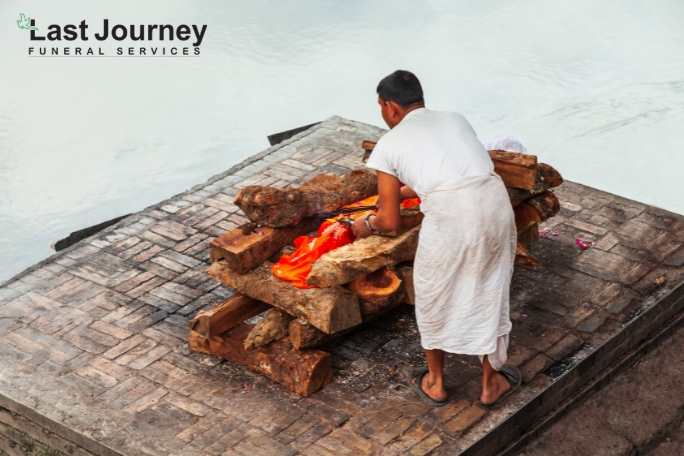Lastjourney Blog
Can Son in Law Perform Last Rites? Know Everything - Last Journey

 Table of Contents
Table of Contents- Let's understand why, son in law is not allowed to perform last rites and participate in the funeral.
- Which religions and sects, son in law can take part in the funeral and other last rites?
- Which changes are embraced by society in the execution of the final rites?
- Conclusion -
In each religion, sect, caste and creed, there is a certain set of dos and don'ts after death in Hindu families, These faiths and beliefs determine the execution of last rites which further ensure the peace, comfort, salvation & dignity of the departed soul.
Although these beliefs are diversified, they hold the ultimate purpose of a dignified farewell for the deceased person. Here we will apprise ourselves of one such distinct belief, "Can a Son-In-Law perform last rites or attend the funeral of his In-laws? If not, What are the compelling reasons behind this notion?"
Let's understand why, son in law is not allowed to perform last rites and participate in the funeral.
In Hindu culture, the final rites and mourning period are considered the mediums that pave the way for the emancipation of the departed soul from all worldly attachments. "Who will perform these ritualistic offerings?" plays a pivotal role according to the Vedic scriptures of the Hindu religion. Besides this, the family of the deceased person should also know, "Who can not perform it?"
According to the sacred scripture of the Hindu religion "Garudpuran", the first right of offering all the dignified final rites belongs to the elder son of the deceased person. But in the absence of the son, a few other family members can take the onus of executing all the final rites.
The strong notion behind carrying out all the responsibilities related to the final rituals by the son is the word "Putra" which comprises two letters 'Pu' and 'Tra'. Here the part 'Pu signifies the hell and Tra conveys free or emancipation.' Therefore the son is liable to perform all the rituals.
The status of a son-in-law is quite revered in Hinduism. The parents of a daughter do not consume the food & water of their son-in-law's family and do not accept any kind of financial aid from them. It is strongly prohibited to touch the bier of their in-laws as well as any family member belonging to their in-laws' family. It is believed that if the son-in-law performs any last rite of his mother-in-law or father-in-law, he is lessening the chances of attaining fruitful outcomes of their good deeds.
Which religions and sects, son in law can take part in the funeral and other last rites?
Unlike the Hindu culture and its beliefs, other sects do not exert rules such as the "prohibition of son-in-law's participation in the funeral, burial and other last rituals" on the family members of the deceased person.
Let's know what are beliefs of other sects and subsects are regarding the participation of son in law in his in-laws' family demise.
1. In Muslim Families -
In the Muslim sect, the family members of the deceased person perform a dignified burial ritual to bid adieu to the departed soul. In the absence of the son, the son-in-law can perform all the last rites and he can even pay for the expenses of funeral arrangments, burial, and other rites.
2. In Sikh Families -
The faith and belief of Sikhism are quite similar to Hinduism. The Sikh families also do not allow the son-in-law to participate in the funeral and cremation of the departed person. Apart from this, their participation and contact with the body of the deceased person are also not allowed in some Sikh families who sternly follow their beliefs.
3. In Christian Families -
The final rites in Christianity are performed under the guidance of a well-learned and experienced priest "Father". There is no restriction on touching, performing service and paying for the funeral & other final rites for son in law of Christian families.
Which changes are embraced by society in the execution of the final rites?
Though following and respecting the beliefs mentioned in the scriptures convey a meaningful message, some changes are frequently striving to create room among them.
Take a look at a few of them.
- Any close family member including son-in-law can take charge of serving their in-laws after their demise by performing the funeral, cremation, and other last rites.
- These days daughters are also respecting their parents after their demise through performing final rituals.
- The funerals are no longer the moment of expressing only grief after losing a beloved person. The families of the deceased have initiated "celebrating the life" after death.
Conclusion -
Death is an integral part of the cycle of life's journey. To tackle this heart-aching end with positivity, all the family members should contribute to the final rites of the departed souls. Precisely, if the departed one has shared a strong bond with any family member, he/she can participate in the last rites. Here, the bonding and emotions take a front seat.
Who is not allowed to perform the funeral and other last rites of a family member?
Why Hindu families do not allow their son-in-law to offer last rites like "Mukhagni" to the human remains of a deceased member of the family?
Why the elder son or only son is preferred to perform the last rites of the parents?
Your email address will not be published. Required fields are marked *












